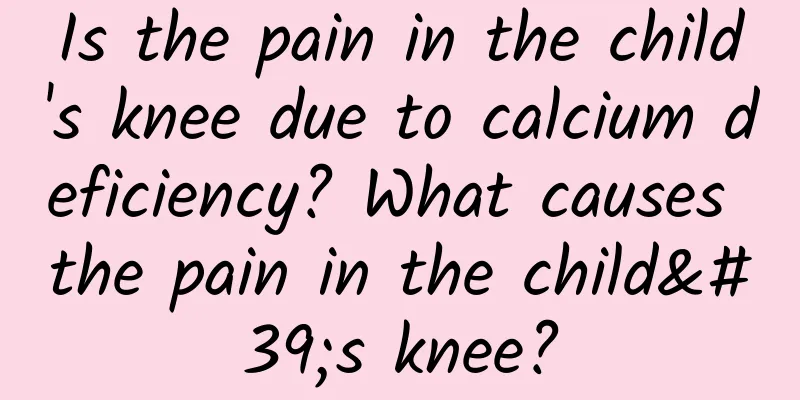Is the pain in the child's knee due to calcium deficiency? What causes the pain in the child's knee?

|
Children will experience growing pains, which means they will feel pain when they are growing taller. Some children may feel very uncomfortable. However, sometimes it is also necessary to rule out other problems. So is the child's knee pain due to calcium deficiency? Is the pain in the child's knee due to calcium deficiency?uncertain. First of all, you have to make sure whether your child has had any bumps, falls, etc. recently. If so, it is best to further confirm whether there is soft tissue contusion, or more serious cartilage damage or meniscus damage. Secondly, check for swelling or redness, and press with your fingers to see if the pain worsens. If so, consider synovitis or meniscus injury. If all the above situations are ruled out, then consider whether you are suffering from calcium deficiency or whether you have increased your activity recently, causing leg pain. If the pain is in the calf or thigh, there are generally two reasons to consider: the amount of activity increases a lot during the day, which leads to uncomfortable leg pain at night, with throbbing pain in the calf; or growing pains caused by calcium deficiency. What causes knee pain in children?There are three main reasons why children have knee pain: Transient synovitis of the hip joint. Symptoms include leg pain, lameness and obturator nerve innervation. In mild cases, the hip joint examination is normal. Children with mild lesions can be treated conservatively, with bed rest and no weight-bearing walking. It is generally recommended to rest for two weeks. If the disease lasts for more than one week, the symptoms will be more severe. Growing pains. Growing pains are the most vigorous physiological response in the early growth stage. Most occur during sleep at night, mainly in the knees and calves, with severe pain and leg cramps. Most people think it is related to excessive exercise. Local massage can be performed twice a day with the hands to relieve subjective symptoms, as well as calcium supplementation. Traumatic pain: If the pain is severe, such as muscle strain or fracture, you should go to the hospital for diagnosis and treatment. What to do when your child has growing pains1. Children suffering from growing pains do not need to be strictly restricted from their normal daytime activities. 2. Some necessary examinations should be done to rule out the above diseases that are not caused by growing pains. 3. Growing pains are a transient clinical phenomenon during the development of some children and will generally disappear on their own within 1-2 years, so parents do not need to be too anxious. 4. Minor pain can be relieved by leg massage. 5. If the child's sleep is affected or the pain is severe, non-steroidal anti-inflammatory drugs can be taken orally, such as ibuprofen suspension. In short, growing pains in children are benign, self-limiting, special clinical phenomena in the growth and development process of children. As long as pathological bone pain diseases are ruled out, excessive treatment is generally not required. |
>>: Why do my knees hurt when I squat? Is knee pain a sign of knee damage?
Recommend
How to cure uterine cold quickly?
If women have problems with uterine cold, they mu...
Which department should I go to if I have breast nodules?
If you have breast nodules, you should go to the ...
Beer is liquid bread. Drinking it frequently can cause four health problems that even doctors find distressing.
At a barbecue stall, a few friends drink beer and...
What are the dangers of having sex just after menstruation?
The menstrual period is particularly important fo...
Why do we need to do stretching exercises when we are exercising? Should we do it before or after we go to the gym?
Anyone who has had experience in exercise and fit...
Have a happy New Year, but beware of "too much joy can lead to sorrow"
This is the 3011th article of Da Yi Xiao Hu The L...
Will breasts get bigger when you get pregnant?
With the change of roles after pregnancy, many pr...
Characteristics of girls who have been single for a long time
Nowadays, "leftover women" has become a...
Acupoints for health | If you suddenly have stomachache, massage Zusanli and Zhongwan
In midsummer, barbecue and beer have become the m...
Rubella causes deformed baby
Pregnant women cannot take medicine or receive in...
Uncovering the secret of the "silent killer" osteoporosis
Osteoporosis is a common aging disease, but it is...
How to stop menstruation when it just started
Basically, most women will become irritable and p...
How to wash bean sprouts? The growth process of bean sprouts
Bean sprouts mainly refer to mung bean sprouts an...









